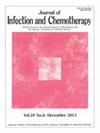2例免疫功能正常患者接种重组带状疱疹疫苗后血清阴性自身免疫性脑炎
IF 1.9
4区 医学
Q3 INFECTIOUS DISEASES
引用次数: 0
摘要
水痘带状疱疹病毒(VZV)作为原发感染引起水痘,并在感觉神经节中建立潜伏期。成人再激活可导致带状疱疹(HZ)。最近开发了一种高效的重组带状疱疹疫苗(Shingrix®)来预防HZ。虽然疫苗安全性数据令人放心,但我们报告了两例首次接种Shingrix®疫苗后血清阴性自身免疫性脑炎(AE)的病例。病例1A, 67岁男性外科医生,在接种疫苗一周后出现头晕、疲劳和失眠,第二天出现精神错乱、躁动、可怕的视觉幻觉、性反常错误和回声。脑成像和脑脊液(CSF)分析无显著差异。针对14种与脑膜炎/脑炎相关的细菌和病毒病原体的脑脊液多重聚合酶链反应(PCR)检测结果为阴性。所有已知AE抗体均为阴性。患者最初通过经验性抗脑膜炎/脑炎治疗得到改善,包括一个为期两天的类固醇疗程,但在停止类固醇治疗后不久复发,需要再次入院。脉冲类固醇治疗后血浆置换导致完全恢复。病例2A 50岁女性儿科医生在接种Shingrix®疫苗9天后出现急性意识混乱。脑脊液分析显示淋巴细胞为主的轻度多胞症和蛋白升高,但脑成像无明显变化。脑脊液脑膜炎/脑炎PCR和AE抗体均为阴性。脉冲类固醇治疗和血浆置换使患者完全康复。结论这两例病例强调了接种Shingrix®疫苗后发生AE的可能性,并强调了及时识别和积极免疫治疗对预防发病率和死亡率的重要性。本文章由计算机程序翻译,如有差异,请以英文原文为准。
Post-vaccinal seronegative autoimmune encephalitis following recombinant zoster vaccination in two immunocompetent patients
Background
Varicella Zoster Virus (VZV) causes varicella as a primary infection and establishes latency in sensory ganglia. Reactivation in adults leads to herpes zoster (HZ). A highly effective recombinant zoster vaccine (Shingrix®) was recently developed to prevent HZ. While vaccine safety data is reassuring, we report two cases of post-vaccinal seronegative autoimmune encephalitis (AE) following the first dose of the Shingrix® vaccine.
Case 1
A 67-year-old male surgeon presented one week after receiving the vaccine with a one-day history of dizziness, fatigue, and insomnia, followed the next day by confusion, agitation, terrifying visual hallucinations, paraphasic errors, and echolalia. Brain imaging and cerebrospinal fluid (CSF) analysis were unremarkable. The CSF multiplex polymerase chain reaction (PCR) panel targeting 14 bacterial and viral pathogens associated with meningitis/encephalitis was negative. All known AE antibodies were also negative. The patient initially improved with empiric anti-meningitis/encephalitis therapy, including a two-day course of steroids but he relapsed shortly after stopping the steroids, necessitating re-admission. Pulse steroid therapy followed by plasmapheresis led to full recovery.
Case 2
A 50-year-old female pediatrician presented with acute confusion nine days after the Shingrix® vaccination. CSF analysis showed lymphocytic-predominant mild pleocytosis and elevated protein, but brain imaging was unremarkable. The CSF meningitis/encephalitis PCR panel and AE antibodies were negative. Pulse steroid therapy and plasmapheresis led to full recovery.
Conclusions
These two cases highlight the potential for AE following the administration of the Shingrix® vaccine and underscore the importance of prompt recognition and aggressive immunotherapy to prevent morbidity and mortality.
求助全文
通过发布文献求助,成功后即可免费获取论文全文。
去求助
来源期刊

Journal of Infection and Chemotherapy
INFECTIOUS DISEASES-PHARMACOLOGY & PHARMACY
CiteScore
4.10
自引率
4.50%
发文量
303
审稿时长
47 days
期刊介绍:
The Journal of Infection and Chemotherapy (JIC) — official journal of the Japanese Society of Chemotherapy and The Japanese Association for Infectious Diseases — welcomes original papers, laboratory or clinical, as well as case reports, notes, committee reports, surveillance and guidelines from all parts of the world on all aspects of chemotherapy, covering the pathogenesis, diagnosis, treatment, and control of infection, including treatment with anticancer drugs. Experimental studies on animal models and pharmacokinetics, and reports on epidemiology and clinical trials are particularly welcome.
 求助内容:
求助内容: 应助结果提醒方式:
应助结果提醒方式:


